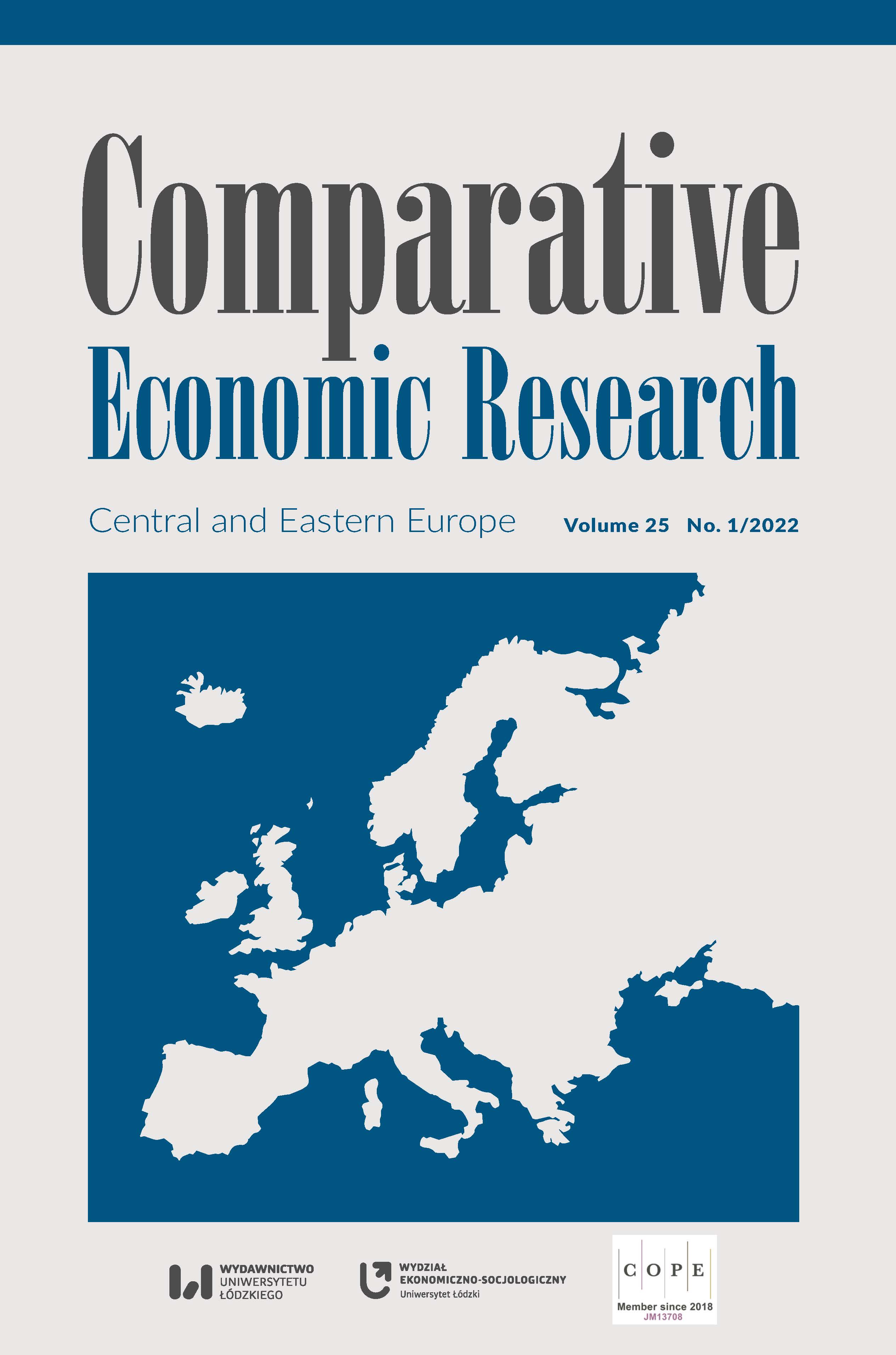Methodological Approaches to the Evaluation of Innovation in Polish and Ukrainian Regions, Taking into Account Digitalization
DOI:
https://doi.org/10.18778/1508-2008.25.04Keywords:
innovation, innovation activity, social innovation, infrastructure, modernization, digitizationAbstract
The article offers aqualimetric assessment of the innovation in regional economic systems, taking into account digitization. The study was based on the methodology of general scientific methods of cognition and special methods of scientific research in the field of the development of productive forces and regional economy. Namely, we used the dialectical method of scientific cognition to identify contradictions and interrelations of innovative development of the subjects of regional economic systems; analysis and synthesis to identify the mechanism for identifying and implementing priority areas of innovation in the regions; the grouping method for clustering regions according to the calculated values of the integrated index of innovation of the regions of Ukraine and Poland; statistical and economic‑mathematical modeling for calculations and modeling of innovation of regions, and other methods.The calculations and analysis of the values of integrated indices of innovation activity in the regions of Ukraine and Poland are performed. These regions are grouped according to this indicator. The cartographic analysis is presented, and the region leaders, region outsiders, and regions with the average value of the integrated index of innovation are singled out. This study has theoretical and applied significance for the development of productive forces and regional economy as it provides for the development of a methodological approach to assessing the innovation activity of the regions of Ukraine and Poland, taking into account digitalization processes.
Downloads
References
Avila‑Lopez, L.A., Lyu, Ch., Lopez‑Leyva, S. (2019), Innovation and growth: evidence from Latin American countries, “Journal of Applied Economics”, 22 (1), pp. 287–303, https://doi.org/10.1080/02102412.2019.1610624
Google Scholar
DOI: https://doi.org/10.1080/02102412.2019.1610624
Falck, O., Koenen, J., Lohse, T. (2019), Evaluating a place‑based innovation policy: Evidence from the innovative Regional Growth Cores Program in East Germany, “Regional Science and Urban Economics”, 79, https://doi.org/10.1016/j.regsciurbeco.2019.103480
Google Scholar
DOI: https://doi.org/10.1016/j.regsciurbeco.2019.103480
Fan, P., Urs, N., Hamlin, R.E. (2019), Rising innovative city‑regions in a transitional economy: A case study of ICT industry in Cluj‑Napoca, Romania, “Technology in Society”, 58, https://doi.org/10.1016/j.techsoc.2019.05.003
Google Scholar
DOI: https://doi.org/10.1016/j.techsoc.2019.05.003
Gajdos, A., Żmurkow, E. (2013), Skilled Personnel Supply and the Prospects for Regional Innovative Development in Poland, “Comparative Economic Research. Central and Eastern Europe”, 15 (4), pp. 45–58, https://doi.org/10.2478/v10103-012-0025-7
Google Scholar
DOI: https://doi.org/10.2478/v10103-012-0025-7
Hlaváček, P., Siviček, T. (2017), Spatial differences in innovation potential of central European regions during posttransformation period, “Journal of International Studies”, 10 (2), pp. 61–73, https://doi.org/10.14254/2071-8330.2017/10-2/4
Google Scholar
DOI: https://doi.org/10.14254/2071-8330.2017/10-2/4
Inkinen, T. (2015), Reflections on the innovative city: examining three innovative locations in a knowledge bases framework, “Journal of Open Innovation: Technology, Market, and Complexity”, 1 (8), https://doi.org/10.1186/s40852-015-0009-5
Google Scholar
DOI: https://doi.org/10.1186/s40852-015-0009-5
Ivanová, E., Masárová, A. (2016), Assessment of innovation performance of Slovak regions, “Journal of International Studies”, 9 (2), pp. 207–218, https://doi.org/10.14254/2071-8330.2016/9-2/16
Google Scholar
DOI: https://doi.org/10.14254/2071-8330.2016/9-2/16
Popelo, O., Tulchynska, S., Garafonova, O., Kovalska, L., Khanin, S. (2021), Methodical approach to assessing innovative development efficiency of regional economic systems in the conditions of the creative economy development, “WSEAS Transactions on Environment and Development”, 17, pp. 685–695, http://doi.org/10.37394/232015.2021.17.66
Google Scholar
DOI: https://doi.org/10.37394/232015.2021.17.66
Revko, A. (2017), Social Entrepreneurship as the Main Resource for the Regional Development, “Marketing and Management of Innovations”, 1, pp. 311–318, https://doi.org/10.21272/mmi.2017.1-28
Google Scholar
DOI: https://doi.org/10.21272/mmi.2017.1-28
Richter, R. (2019), Rural social enterprises as embedded intermediaries: The innovative power of connecting rural communities with supra‑regional networks, “Journal of Rural Studies”, 70, pp. 179–187, https://doi.org/10.1016/j.jrurstud.2017.12.005
Google Scholar
DOI: https://doi.org/10.1016/j.jrurstud.2017.12.005
Xu, Y., Li, A. (2020), The relationship between innovative human capital and interprovincial economic growth based on panel data model and spatial econometrics, “Journal of Computational and Applied Mathematics”, 365, https://doi.org/10.1016/j.cam.2019.112381
Google Scholar
DOI: https://doi.org/10.1016/j.cam.2019.112381
Downloads
Published
How to Cite
Issue
Section
License

This work is licensed under a Creative Commons Attribution-NonCommercial-NoDerivatives 4.0 International License.











